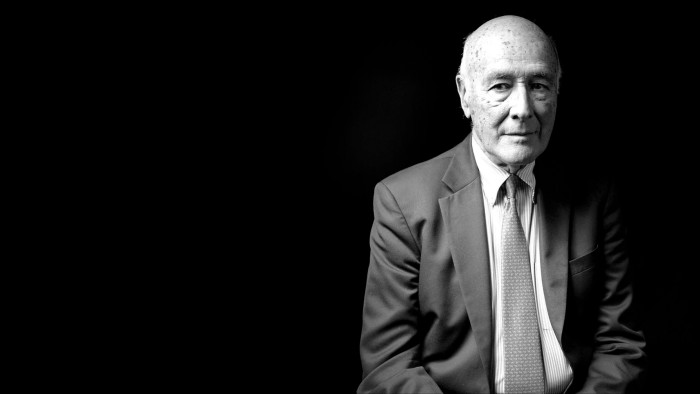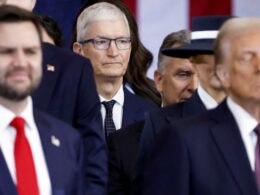Joseph Nye, grand figure of American political science, coiner of the term “soft power”, and, in the words of the New York Times, “charter member of America’s foreign policy establishment” wrote his final piece for Monocle shortly before he died in Massachusetts last week, aged 88. It was published posthumously. Here is the last paragraph he ever wrote: “Donald Trump clearly does not understand soft power and undercuts it by actions such as abolishing USAID, silencing the Voice of America, threatening allies and belittling climate change. China values soft power — and stands ready to fill the vacuum that Trump is creating.”
That last line was intended to sting. Forty-odd years ago, Nye founded the Aspen Strategy Group, where, full disclosure, my wife, Niamh King, works. He stepped down earlier this year as co-chair. I am biased, of course, but the ASG’s public conference, the annual Aspen Security Forum, is the single best way I’ve found of catching up with global and American leaders, national security figures and public intellectuals all in one place. Something about being cocooned on the Aspen Meadows campus, 8,000 feet up in the Rockies, is conducive to insightful exchanges. It is far harder for public figures to grandstand in that Arcadian setting.
From a journalist’s perspective, ASF is hyper-efficient. You can have coffee with a Five E intelligence chief, another with the head of one of America’s regional commands, and a nightcap with a senator without moving more than a few hundred feet. This was Nye’s preferred approach. Though a life-long Democrat, serving in the administrations of Jimmy Carter and Bill Clinton, Nye was scrupulously non-partisan in his approach. But that is an increasingly elusive state of mind in the age of Maga polarisation.
It is easy to say that Trump is destroying US soft power. And it is impossible to calculate his level of damage to the American brand. But I have two caveats. As Nye’s late Harvard colleague, Samuel Huntington, wrote in his The Clash of Civilizations in the early 1990s, people around the world might dress and even sound American but that does not necessarily make them pro-American. The 9/11 hijackers wore blue jeans, drank Coke and may have enjoyed the occasional episode of Friends. That didn’t lessen their hatred of America.
The second is that Trump has his own soft power. Nowhere better illustrates this than the Persian Gulf, whose potentates see Trump as the kind of American with whom they can do business — no moral tutorials, just deals. The feeling is clearly reciprocal. As the joke goes, Trump might be mixing up Gulf with “golf” but the oil-rich Arab monarch states seem to like Trump’s 18-hole courses and the gilded branding on it.
As Daniel Drezner outlined in a Substack essay entitled “Joseph Nye, R.I.P.”, the chief criticism of Nye’s notion of soft power is that it is hard to measure. But that does not invalidate the goal. Its clearest institutional expression is the US state department, which is being downsized and demoralised at remarkable speed by the current administration. Perhaps the best compliment to Nye is the fact that so many countries, including China, asked his advice on how to make use of their own soft power.
As the US closes embassies and consulates across the global south, and withdraws humanitarian and emergency aid from the world’s neediest, China is filling the vacuum. The world’s consumers may not know or care where their American jeans are made (mostly in China); but they know who comes to their aid when they need help.
On a personal level, Nye was unfailingly kind, curious about what other people had to say, and never disagreed disagreeably. He personified American soft power at its best. I could think of no better epitaph than that. I’m turning this week to David Rothkopf, a former Clinton official, CEO of TRG Media, widely read columnist and, most importantly, a friend of Nye. David, what have I missed?
Recommended reading
-
Talking of the Gulf, my column this week looked at Trump’s gargantuan self-dealing.
-
Do also read my colleague Gideon Rachman on Trump and the art of the international peace deal. Likewise, Alec Russell was very good on how not to fight populism — with Romania as his case study.
-
In that vein, I risked censure from some of my liberal friends for doing a fireside chat at the Weekend FT Festival last Saturday with Steve Bannon, notorious Maga strategist, host of the daily War Room podcast and fanatical FT reader. He is one of the few people to be seen going into prison with the pink paper under his arm. I disagree with Bannon on fundamental issues, though I share his diagnosis of middle-class economic stagnation. But I learned a lot from this 50-minute conversation. I cannot imagine why it would be better not to engage than engage. Nye would agree.
-
Finally, as many Swampians will have picked up, my book, Zbig; Life of Zbigniew Brzezinski, America’s Great Power Prophet, came out on Tuesday. I’ve taken part in too many events linked to the book to mention them all, but I’d like to highlight two: first, my DSR podcast with David, which is peppered with Rothkopfian witticisms; and the second, at the Aspen Institute with Kurt Campbell, Joe Biden’s deputy secretary of state, and a diplomat-entrepreneur in the mould of the late Richard Holbrooke, was among the best public events I’ve done.
David Rothkopf replies
Joe Nye not only framed the principles that made soft power work, he lived them. In worlds from academia to government in which sharp elbows and muscle-flexing are commonly used tools to get ahead, Joe embodied the power of attraction he wrote about.
When he died, I spoke to several of his former colleagues and each referred to him in language reserved for family members or close friends. One former top Biden official wrote to me: “I loved Joe Nye.” Trust me when I say that when the same people eulogised Henry Kissinger, for example, “love” was not among the words they used.
I joined the Clinton administration shortly after Joe introduced the idea of “soft power”. When I framed much of what we were doing as “commercial diplomacy” he was a warm and supportive guide in drawing the connections between our approach and his idea.
Since Ed mentioned his wife, I’ll also mention mine, Carla Dirlikov, an opera singer who has, through work with the state department and as a Biden administration “arts envoy”, spent her career focused on “cultural diplomacy”, another dimension of soft power. She worked with Ambassador Nicholas Burns, a friend and protégé of Nye’s, to create a programme on the subject at Harvard’s Kennedy School, which Nye helped build.
Joe was crucial to the programme’s success, generously offering advice and encouragement at every step of the way and validating the effort with the unparalleled respect and admiration he had earned over his extraordinary career. Beyond his ideas, it was the “soft”, rare and profound powers of Joe’s personality that will be missed most by the many who knew and learned so much from him.
Your feedback
We’d love to hear from you. You can email the team on swampnotes@ft.com, contact Ed on edward.luce@ft.com and follow him on X at @EdwardGLuce. We may feature an excerpt of your response in the next newsletter
Source link









